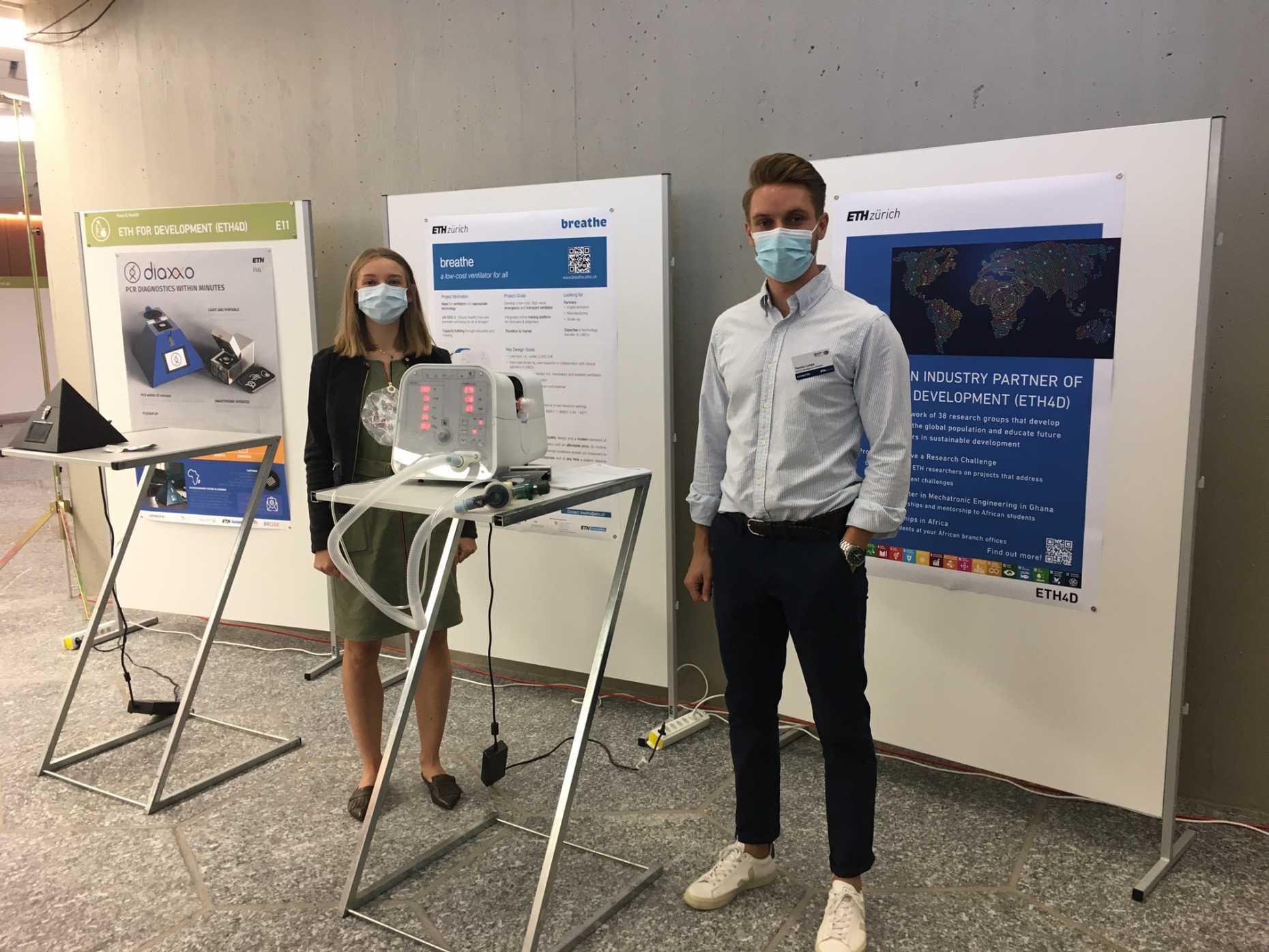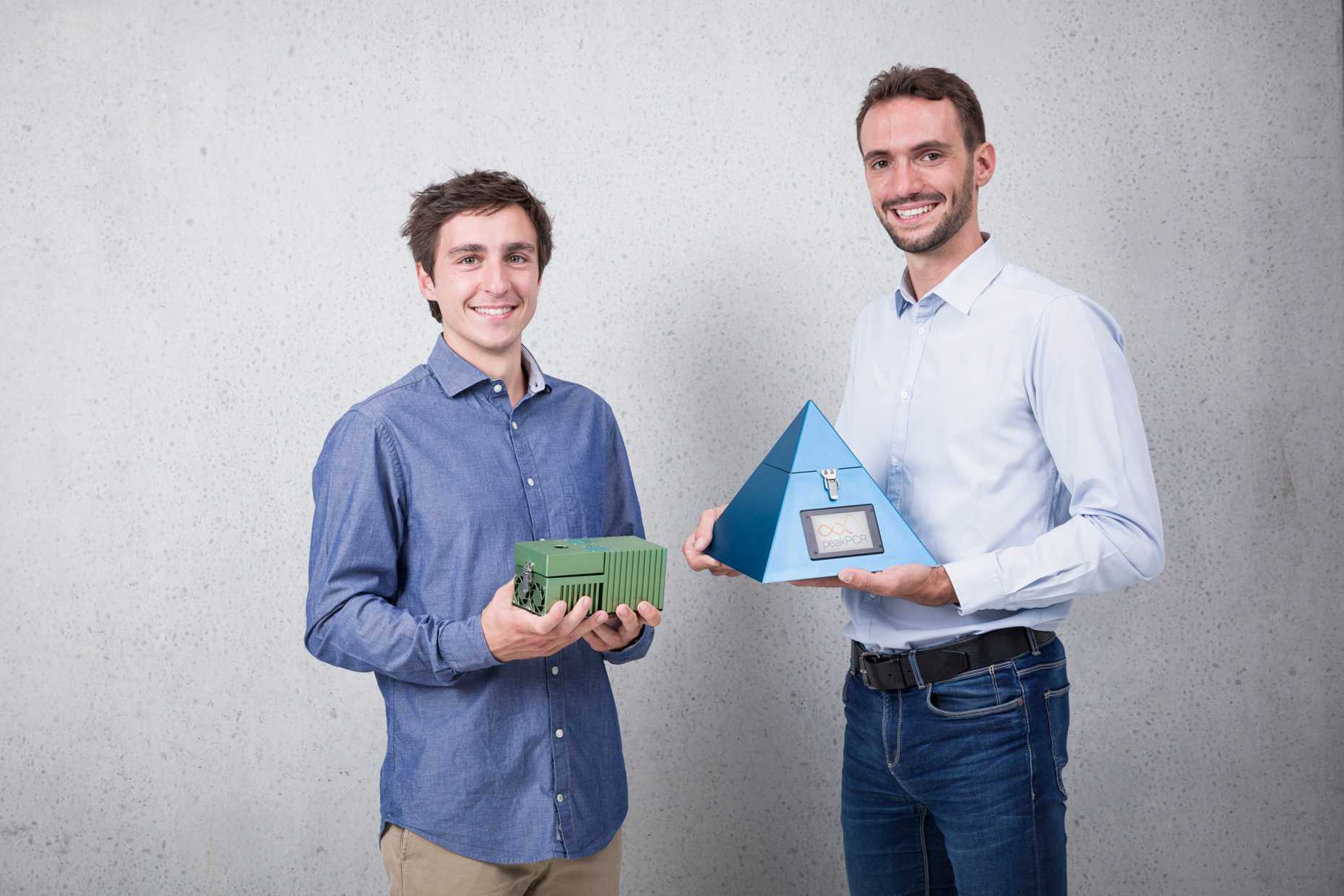Interview: Breathe and Diaxxo develop innovative technologies for global health
At this year's Industry Day, two projects from the ETH4D network presented their innovative technologies for global health - "breathe", a low-cost ventilator and "peakPCR", a fast PCR testing device.
In this interview, Dr. Aleksandra Sadowska and Dr. Thomas Lumpe (breathe) as well as Dr. Michele Gregorini and Philippe Bechtold (external page Diaxxo) talk about their innovations and the impact they see in low-income countries.
Breathe - A low-cost ventilator for all

You are developing a low-cost, holistically designed ventilator that meets the unique needs of low- and middle-income countries. How does the technology work and where do you envision its future application?
Our transport ventilator is based on the automatic compression of a resuscitator bag. It is a simple mechanical design built with about 80% standard components with added high-tech control systems to provide various ventilation modes conforming to the medical standard of care. Our team is developing the technology for emergency applications in hospitals and for patient transport. Our aim is to facilitate access to low-cost medical devices and their sustainable use in low-resource settings.
How do you determine the requirements for a ventilator in low and middle-income countries? Are you working with partners?
By investigating user needs and identifying existing barriers, we are exploring why certain solutions do or do not work, and what are the requirements for a successful implementation of a medical device, such as a ventilator, in low-resource settings. In our design, we want to implement ideas aimed at eliminating those barriers and empowering the users. As both the user needs and the local environment can be very different in low- and middle-income countries to what we are accustomed to in Switzerland, it is essential for us to establish local collaborations. We are currently in touch with different potential collaborators in African countries and we are preparing for our first field study.
What milestones have you been able to achieve since the beginning of the project and what are your plans for the future?
We are currently in the detail design phase of the product and have already produced and successfully tested six working prototypes. We are currently focused on improving the design with respect to robustness, maintainability, compliance with the ISO norms, and usability to make our ventilator ready for field testing. We are looking for more funding to support our project financially as well as for new project partners in Switzerland and in the low- and middle-income countries.
Diaxxo - An innovative Point-Of-Care Polymerase Chain Reaction (PCR) device

How exactly does your device work and what makes it special compared to other PCR testing technology?
Diaxxo has developed an innovative Point-Of-Care Polymerase Chain Reaction (PCR) device that works with ready-to-use test cartridges, in order to make PCR analysis extremely fast and more accessible. Our cartridge has two main advantages: first, thanks to the new form factor and the material selection, we can achieve incredible PCR performance in a short time (up to 80% faster than conventional instrumentation); and second, with our proprietary technology, we are able to pre-load all the necessary reagents in dry form on the surface of the cartridge and therefore eliminate all the pre-processing and mixing steps, cut the sample-to-results time and allow storage at room temperature. Thanks to this unique technology, we can considerably reduce the sample preparation steps and allow the final user to benefit from time and cost reductions. With our products, family doctors and medical centers will be able to offer a new, on-site diagnostic service for the rapid (<30 min) detection of viral and bacterial diseases.
You have launched a study in Zanzibar this year. Can you tell us more about this study?
After successfully demonstrating the potential of our technology in providing fast PCR diagnosis for Covid-19 (early 2020), we have been developing test cartridges also for Sexually-Transmitted-Infections, Dengue, Malaria and other tropical diseases, thanks also to our strong collaboration with the Swiss Tropical and Public Health Institute (Swiss TPH). Recently our technology has been implemented for a large-scale Schistosomiasis testing campaign in Zanzibar, where our devices and test cartridges are used for the screening of more than 10’000 children in mobile laboratories arranged in schools across the island. Moreover, in the context of the BRCCH-EDCTP Collaboration Initiative 2020, in July 2021 we delivered devices and test cartridges for more than 2’000 patients in seven different laboratories in Africa (Ghana, Senegal, Madagascar, Nigeria, Republic of the Congo, Sudan and Uganda) for the detection of Covid-19.
What impact do you see for your device in low-income countries?
Fast and reliable diagnostics are essential for identifying and controlling diseases, however these are available in only 1% of primary-care clinics in many low- and middle-income countries. We aim to expand universal access to fast and reliable diagnostics thanks to our devices and test cartridges that allow for the reliable detection of multiple pathogens within a short time. Our technology could improve the access to healthcare in more rural or less developed areas, where the ability to run low-cost PCR analysis could have a particularly significant impact. In higher and medium income settings, our PCR device could help to decentralise testing facilities and effectively speed up the testing campaigns. Thanks to the sample-preparation device that we are developing, even minimally trained users would be empowered to perform a complete PCR diagnostic test. In line with the WHO guidelines, we believe that broad access to reliable and fast tests is a vital component to overcome the current pandemic and to fight future outbreaks of COVID-19 and other infectious diseases.